In the current legal climate where “everyone is an originalist, ” conventional wisdom suggests that judges merely find law, rather than make it. Orthodox common-law jurisprudence makes fidelity to the past the central goal and criterion. By contrast, the alternative approach, “reading the law forward”—what some call judicial pragmatism or consequentialism—is viewed as heretical. Rather than mount a theoretical defense of a forward-thinking jurisprudence, legal historian Peter Charles Hoffer offers an empirical study of how this approach to constitutional interpretation actually leads to better law. Reading Law Forward looks at seven judges who exemplify this alternative jurisprudence: John Marshall, Joseph Story, Lemuel Shaw, Louis D. Brandeis, Benjamin Cardozo, William O. Douglas, and Stephen G. Breyer.
“In the hands of America’s leading judges, a jurisprudence of reading law forward enabled courts to respond to the challenges of changing conditions. It kept law fresh. It promoted and still promotes the growth of a democratic society, ” Hoffer convincingly argues.
Daftar Isi
Introduction: Reading Law Forward
1. John Marshall
2. Joseph Story
3. Lemuel Shaw
4. Louis D. Brandeis
5. Benjamin N. Cardozo
6. William O. Douglas
7. Stephen G. Breyer
Conclusion: The Making of a Democratic Jurisprudence
Acknowledgments
Notes
Index
Tentang Penulis
Peter Charles Hoffer is distinguished research professor of history, University of Georgia, and the author of numerous publications, including Daniel Webster and the Unfinished Constitution; Rutgers v. Waddington: Alexander Hamilton, the End of the War for Independence, and the Origins of Judicial Review; The Free Press Crisis of 1800: Thomas Cooper’s Trial for Seditious Libel; and, with Williamjames Hull Hoffer and N. E. H. Hull, The Supreme Court: An Essential History, Second Edition, all from Kansas.












